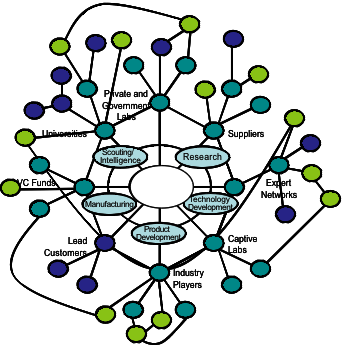What Industries Use Expert Networks?
So, you’re curious about expert networks and the industries that use them? Well, you’ve come to the right place! Expert networks are invaluable resources that connect professionals with industry experts, providing valuable insights and expertise on various topics.
Picture this: you’re an entrepreneur looking to launch a new tech startup. You have a brilliant idea, but you need guidance from someone with experience in the technology industry. This is where expert networks come in. These networks connect you with experts who have deep knowledge and real-world experience in the tech world. They can help you understand market trends, navigate industry challenges, and provide strategic insights to help your startup succeed.
But wait, there’s more! Expert networks are not limited to just the technology industry. They span a wide range of sectors, from finance and healthcare to energy and consumer goods. Whether you’re in need of insights on financial markets or seeking guidance on the latest medical advancements, expert networks have got you covered.
So, buckle up and get ready to explore the fascinating world of expert networks and the industries they serve. From finance to healthcare to technology and beyond, these networks offer an incredible wealth of knowledge and expertise. Let’s dive in and discover how these networks can revolutionize your business and help you thrive in your industry. Get ready to unlock a world of insights!

What Industries Use Expert Networks?
In the modern business landscape, expert networks have become an invaluable resource for industries across the board. From healthcare and technology to finance and consumer goods, expert networks provide access to highly specialized knowledge and insights. Companies from various sectors leverage expert networks to gain a competitive edge, make informed decisions, and stay ahead of the curve. In this article, we will explore the industries that extensively use expert networks and the benefits they offer.
Healthcare Industry
The healthcare industry heavily relies on expert networks to access the latest medical research, conduct peer-to-peer consultations, and stay updated with emerging treatment protocols. Doctors, researchers, and pharmaceutical companies tap into these networks to connect with top experts in specialized fields such as oncology, neurology, and cardiology. Expert networks allow medical professionals to exchange vital information, seek second opinions, and enhance patient care through collaborative efforts.
For pharmaceutical companies, expert networks facilitate valuable insights on market trends, clinical trial protocols, and drug development strategies. These networks connect pharmaceutical companies with key opinion leaders and subject matter experts, enabling them to optimize their research and development processes and make informed decisions with regards to drug discovery and commercialization.
The healthcare industry’s reliance on expert networks continues to grow as healthcare systems become more complex, and advancements in medical research and technology pave the way for innovative treatments and therapies.
Technology and IT Industry
The fast-paced and ever-evolving technology and IT industry heavily relies on expert networks to stay updated with the latest trends, overcome technical challenges, and foster innovation. By connecting with technology experts and thought leaders through these networks, companies can gather valuable insights on emerging technologies, industry best practices, and market forecasts.
Start-ups and established players in the technology sector utilize expert networks to validate their product ideas, receive guidance on product development, and gain strategic insights for market entry and expansion. These networks act as a bridge between entrepreneurs and industry veterans, fostering collaboration and knowledge sharing.
Moreover, IT departments within organizations leverage expert networks to address technical issues, optimize their infrastructure, and keep pace with the rapidly evolving digital landscape. Expert networks provide them access to specialized IT professionals who can offer expert advice and guidance on a wide range of IT-related challenges and opportunities.
Finance and Investment Industry
The finance and investment industry heavily relies on expert networks to make informed investment decisions, conduct due diligence on potential investments, and gain insights into market trends. Expert networks connect financial analysts, investors, and fund managers with industry experts, economists, and seasoned professionals who can provide unique perspectives and insider knowledge.
Investment firms and hedge funds tap into expert networks to gain a competitive edge by accessing expert opinions on specific sectors, industries, or companies. These networks enable them to validate investment theses, identify potential risks and opportunities, and optimize their portfolios through expert guidance.
Furthermore, expert networks serve as a valuable resource for traditional banking institutions, accounting firms, and financial advisory firms. They connect professionals in these sectors with experts who can offer insights on regulatory changes, financial models, and risk assessment strategies. Expert networks also play a crucial role in facilitating networking opportunities and enabling knowledge sharing within the finance and investment industry.
Retail and Consumer Goods Industry
In the retail and consumer goods industry, expert networks provide valuable insights on consumer preferences, market trends, and product development strategies. Companies in this industry leverage expert networks to access consumer behavior experts, market research professionals, and industry insiders who can provide actionable insights.
By connecting with experts through these networks, retail and consumer goods companies can optimize their product offerings, refine their marketing strategies, and make data-driven decisions. Expert networks also play a crucial role in helping companies navigate changing consumer trends, emerging markets, and industry disruptors.
Additionally, expert networks provide valuable opportunities for collaboration and knowledge sharing among industry professionals. They enable brand managers, marketers, and product developers to stay connected with the latest trends, share best practices, and learn from industry experts.
Energy and Utilities Industry
The energy and utilities industry relies on expert networks to gain insights on sustainable energy solutions, regulatory frameworks, and emerging technologies. Companies in this sector connect with experts through these networks to obtain guidance on renewable energy projects, energy efficiency strategies, and environmental impact assessments.
Expert networks also play a crucial role in helping energy and utility companies navigate complex regulatory environments, stay updated with energy policy changes, and understand the implications of new regulations on their operations. By connecting with energy industry experts, companies in this sector can make informed decisions, optimize their energy generation and distribution processes, and align their operations with environmental and sustainability goals.
Moreover, expert networks facilitate knowledge sharing and collaboration within the energy and utilities industry. They provide platforms for professionals to exchange insights, discuss industry challenges, and explore new opportunities for innovation and growth.
Key Takeaways: What Industries Use Expert Networks?
Expert networks are used by various industries to gain insights and knowledge from professionals in specific fields.
- Finance: Banks, investment firms, and hedge funds use expert networks to access industry experts for market analysis and investment strategies.
- Healthcare: Pharmaceutical companies and medical organizations consult with expert networks to obtain expert opinions and guidance in drug development and healthcare advancements.
- Technology: Tech companies utilize expert networks to gather insights from industry experts for product development, market trends, and innovative solutions.
- Legal: Law firms and legal professionals seek expert networks for expert witnesses, industry analysis, and legal consultation in their cases.
- Consulting: Consulting firms rely on expert networks to access subject matter experts to enhance their research, analysis, and strategic recommendations for clients.
Frequently Asked Questions
Welcome to our FAQ section on expert networks! Here, we will address some commonly asked questions related to the industries that utilize expert networks. Expert networks are increasingly popular in various fields, connecting professionals with industry-specific knowledge to businesses seeking their expertise. Read on to learn more!
1. How do expert networks benefit the healthcare industry?
In the healthcare industry, expert networks provide valuable insights and research for medical professionals, pharmaceutical companies, and healthcare organizations. These networks connect doctors, researchers, and industry experts with organizations seeking their expertise. By tapping into expert networks, healthcare professionals can access the latest medical advancements, gain insights into patient care, and make informed decisions for better healthcare outcomes.
Moreover, expert networks support the healthcare industry in areas such as clinical trials, drug development, and medical technology research. They facilitate knowledge sharing, collaboration, and the exchange of ideas, ultimately contributing to advancements in healthcare practices and treatments.
2. What role do expert networks play in the technology sector?
In the technology sector, expert networks are essential in driving innovation and growth. Technology companies often rely on expert networks to connect with engineers, software developers, and industry specialists who possess deep knowledge in specific fields or technologies. These networks enable companies to gain insights into emerging trends, conduct market research, and receive guidance on product development and implementation.
Expert networks also serve as a platform for technology professionals to share their expertise, collaborate with others in the industry, and stay up-to-date with the latest advancements. Whether it’s software development, artificial intelligence, cybersecurity, or any other tech-related field, expert networks foster knowledge exchange and drive progress in the technology sector.
3. How are expert networks valuable to the finance and investment industry?
The finance and investment industry greatly benefits from expert networks as they offer access to professionals with in-depth knowledge of specific markets, industries, and investment strategies. Hedge funds, asset management firms, and investment banks use expert networks to connect with economists, financial analysts, and industry experts who can provide insights into market trends, investment opportunities, and risk assessment.
Through expert networks, finance professionals can gain unique perspectives, receive customized advice, and make well-informed investment decisions. These networks also play a crucial role in due diligence processes, helping investors assess the viability of potential investment targets and reducing risk in financial transactions.
4. How do expert networks contribute to the legal industry?
The legal industry relies on expert networks to connect lawyers, legal researchers, and law firms with highly knowledgeable subject-matter experts. Expert networks assist in gathering expert opinions and insights for legal cases, providing professionals in the legal field with access to specialists who can provide expert testimony, technical advice, and industry-specific knowledge.
Expert networks help legal professionals strengthen their cases, enhance their understanding of complex legal matters, and ensure accurate representation in court. Whether it’s intellectual property disputes, corporate law, or any other legal area, expert networks offer invaluable support to the legal industry.
5. How are expert networks utilized in the consulting industry?
The consulting industry relies heavily on expert networks for their clients’ projects and research needs. Management consulting firms, strategy consultants, and market research companies use expert networks to connect with industry experts who possess specialized knowledge and experience relevant to the projects they are working on.
By tapping into expert networks, consultants can gain insights into specific industries, validate assumptions, and access market research data. Expert networks enable consultants to provide their clients with well-informed advice, recommendations, and industry benchmarks, ultimately helping businesses make strategic decisions and drive growth.
Expert Networks explained in under 3 minutes!
Summary
Expert networks are used by many different industries to gain specialized knowledge and insights. These industries include finance, healthcare, technology, and consumer goods. Expert networks connect professionals who have specific expertise with companies seeking their knowledge. By using expert networks, businesses can access valuable information to make better decisions and stay ahead in their respective fields. Expert networks play a crucial role in connecting experts and businesses, making them an important resource for various industries.


